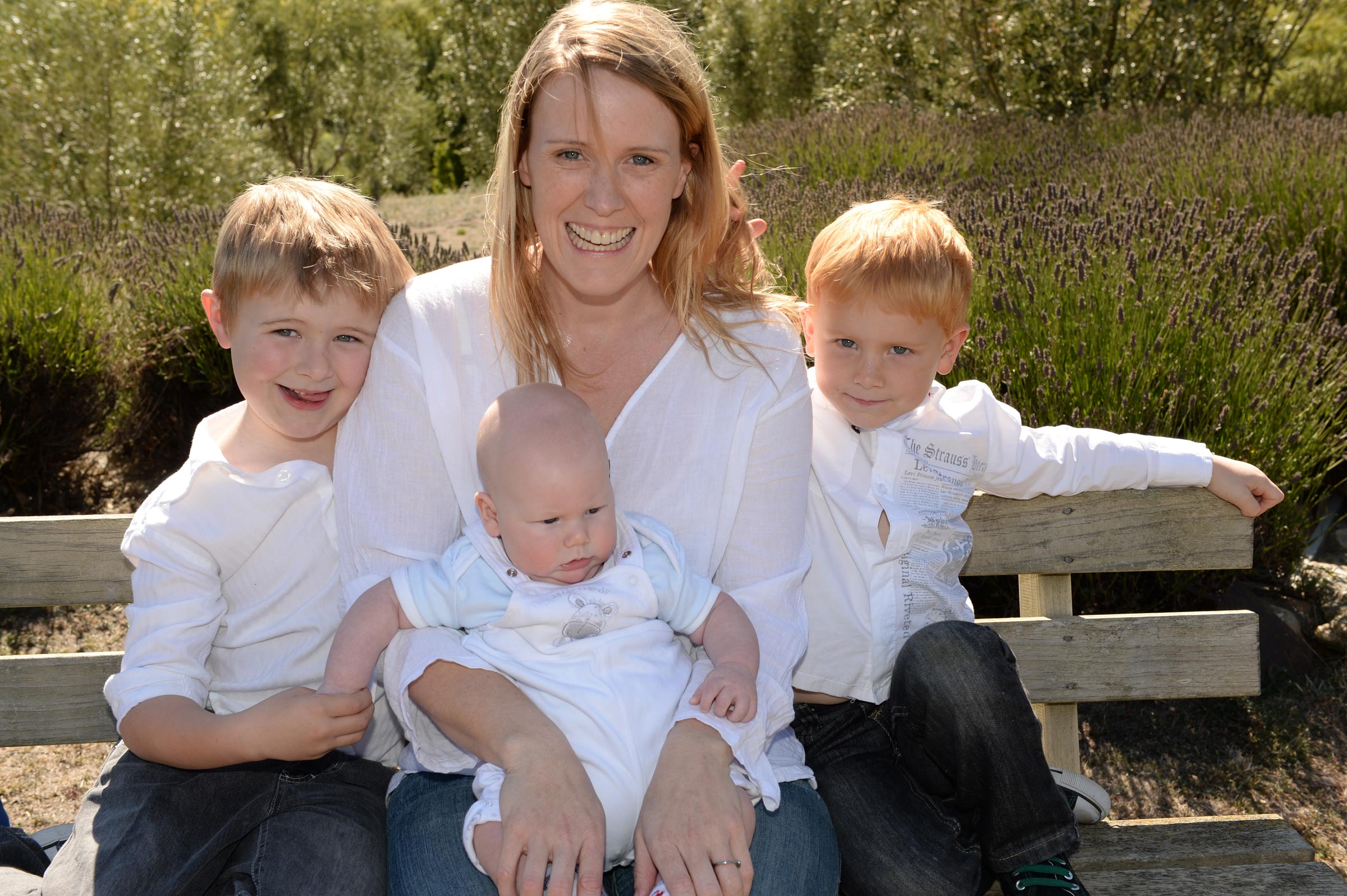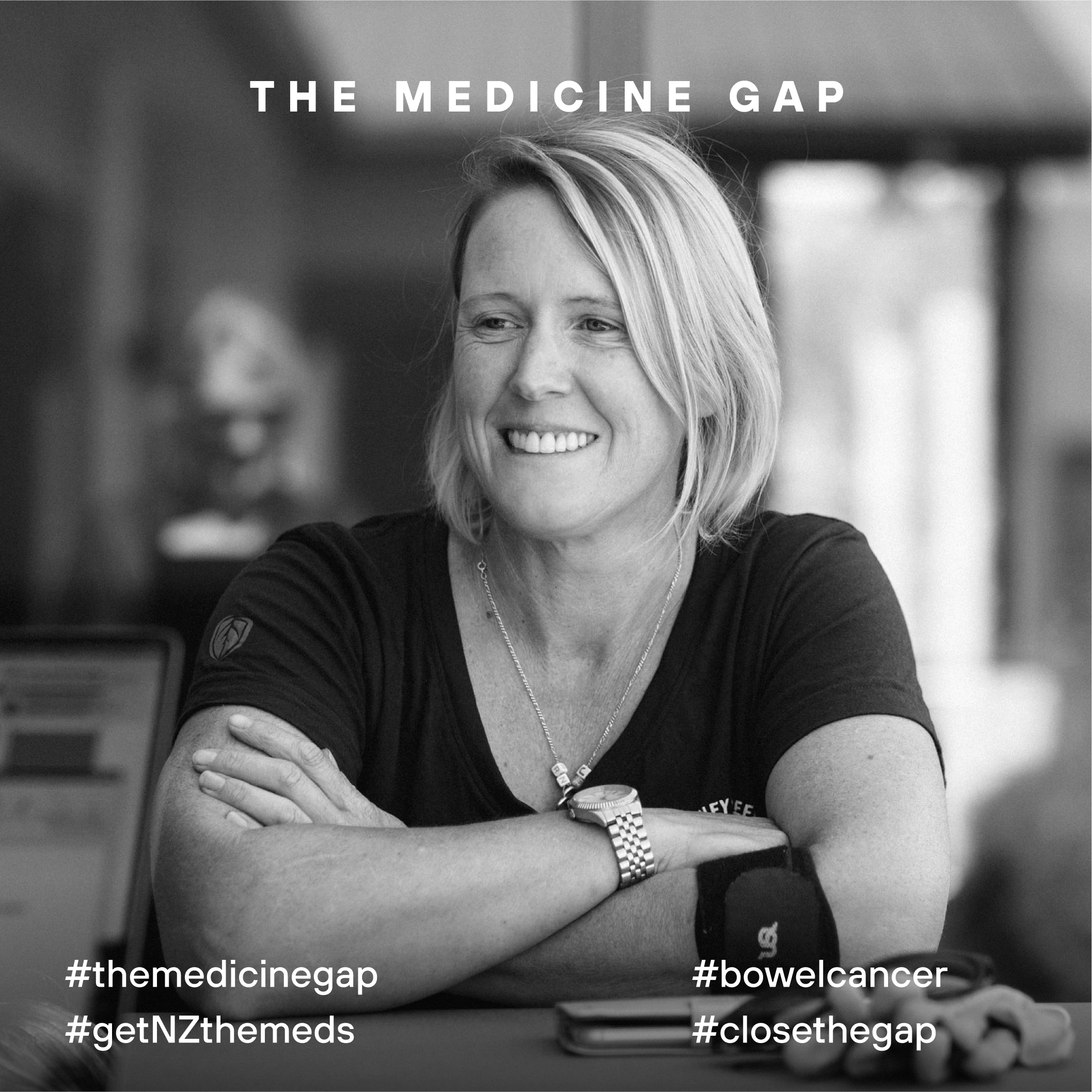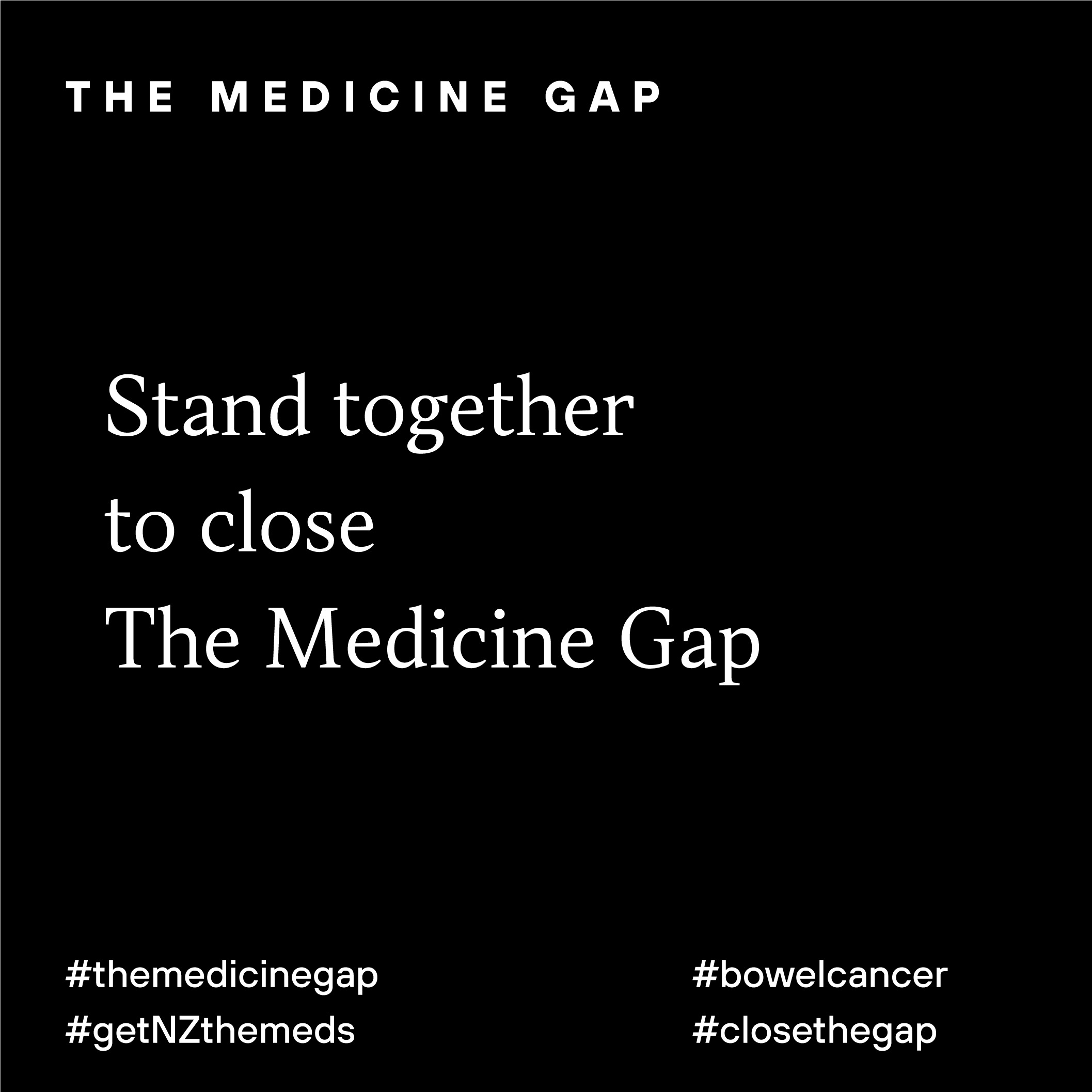Kat
On Valentine’s Day, in 2015, Kat was admitted to Auckland Hospital.
Along with her partner, Jarred, she had travelled from Cromwell to Auckland for a weekend away with his work colleagues. The couple’s three young sons were at home in Cromwell, being looked after by family.

The group were out on a yacht in the Hauraki Gulf when Kat began to feel ill. She lay down for a while but once she was back on land, her nausea intensified.
“I ran a bath and when I looked down at my stomach, I had this bulge. I found out later that my bowel had perforated my stomach lining,” Kat says.
Jarred waited with Kat at the hospital for several hours before he returned to their hotel to pack some clothes and essentials. Kat was alone when the doctor returned with the results of a CT scan.

“He told me I had cancer and I remember sitting there, in this sort of out-of-body moment, and thinking ‘I can’t have cancer. I’ve got three kids’.”
Kat and Jarred have three young boys. The eldest, Jayden, was five years old and had just started school. His younger brother, Nate, was three, and Ryan was a new-born. He was just eight weeks old when his mum was diagnosed with terminal bowel cancer.
Kat says the shock hit her first, and then the panic set in.

“It was one o’clock in the morning and I phoned my Dad first, but all I could think was ‘how am I going to tell Jarred? What about our kids?’”
Kat’s father is Professor Ross Lawrenson, a Waikato academic, and in an extraordinary coincidence, he was working with oncologist Chris Jackson gathering data on people admitted to hospital with previously undiagnosed bowel cancer. The statistics were alarming; 33% of people were being diagnosed with bowel cancer in an emergency department, often with late stage or terminal cancer.
The news was shattering. Kat had become a statistic in her father’s study.
“I phoned Jarred…it was such a difficult call. He came straight back to the hospital….” but then Kat’s voice trails off, overcome by emotion.
Jarred would later tell Kat about the drive back to the hospital.
“He told me that he just kept talking to the man upstairs and saying ‘don’t you dare do this to me, don’t you dare’.”

Kat is, by her own definition, a typical South Island woman. She’s practical, down to earth, and loves a good laugh. But seven years later, she doesn’t know how she made it through the days that immediately followed her diagnosis.
“It’s all a bit of a blur. I know Jarred slept next to me on a hospital chair that night, but I don’t remember a lot else.”
The next morning, the doctors told Kat she needed surgery and she was given two options. She could have the surgery in Auckland, or she could return to the South Island and have the surgery in Dunedin.
“I said ‘just get it out’. Whatever it was, I just wanted it out of me.”

The surgery in Auckland lasted several hours. Kat had 33 lymph nodes removed, 18 of which were cancerous, and an 8cm tumour cut from her bowel. An MRI would later reveal black spots on her liver, a sign the cancer had metastasised or spread, and some of her remaining lymph nodes had cancer including those near her aorta, but Kat’s lungs were clear.
“I think I just tried to focus on the positives. The fact it hadn’t spread to my lungs….that was a positive so I focused on that. That’s how Jarred and I approached it all. You just have to look for the positives.”
Kat spent 12 days in hospital and on the day she was discharged, her specialist came to see her.
“She put her hand on my knee and said ‘this isn’t your fault, this is just really shit luck’. I’ll never forget that’.”

Chris Jackson, the oncologist working with Kat’s father, took over her treatment. Kat says Dr Jackson quickly became an important man in her life, and she remembers some of their early conversations when he helped her come to terms with her prognosis.
“Chris said ‘I can’t cure you’…. and to hear those words is pretty tough.”
Kat asked him if that meant her condition was terminal.
“He said ‘no, terminal means you’re in the process of dying and right now you’re in the process of living’.”
Dr Jackson also told Kat about an unfunded immunotherapy drug called Avastin. It starves tumours of a blood supply, and is used to treat advanced forms of bowel cancer. Avastin is widely funded in the western world and although the drug’s developer applied to New Zealand’s drug buying agency, Pharmac, for funding in 2009, it was declined. Avastin has languished on our waiting list for over 12 years. Treatments vary, but Kiwis can access the drug for approximately $25-$30k plus the cost to administer it in a private hospital. On top of that, the Government also applies GST to the medicines it doesn’t fund.
Kat’s goal was to prolong life, and the first step was to bombard the remaining cancer cells with chemotherapy, teamed with Avastin.
“I remember my first chemo. I was crying. I was terrified. It’s just such a daunting experience going in for your first chemotherapy treatment. You ask yourself ‘how did I get here? How is this happening’?”
On the drive home to Cromwell, Kat remembers pulling over just past Roxburgh so she could vomit.
“It made me realise that this was going to be tough.”

Midway through her chemotherapy, Kat was on seven different anti-nausea medications. She couldn’t sleep, she was constantly vomiting and she was always dehydrated.
“It’s brutal. Absolutely brutal. You just feel so sick.”
It was during chemotherapy that Kat and Jarred decided they should marry. They had planned to before Kat became ill, and now it suddenly felt even more important.
“I went wedding dress shopping and I remember sitting in one of the changing rooms feeling so incredibly ill. I thought ‘how am I going to get through a wedding if I feel so ill’?”
One year after Kat’s diagnosis, she went off one of the drugs that was making her so ill, but continued with Avastin. Kat says Avastin is why she is still here today.
CT scans showed her cancer was getting smaller and smaller until the cancer couldn’t be detected at all. In 2018, Kat was taken off all chemotherapy.
“I didn’t know what to do with myself. I thought I’d be on chemotherapy for the rest of my life.”

However, six weeks after she went off the medication, Kat was admitted to the emergency department with another tumour. Remarkably, it wasn’t secondary cancer. It was another primary tumour in her small bowel which had been supressed by the chemotherapy. It had reared its head again after Kat stopped the chemotherapy. The surgeons removed the tumour and 30cm of her small bowel, and Kat continued with the Avastin.
“I have been living with cancer for seven years now and my whole perception of this disease has changed over that time. Initially, it’s a death sentence, particularly when you’re diagnosed with Stage Four. And I felt that I needed to do everything before my time ran out. That’s changed now.”
“I started to look at cancer more as an incurable disease, rather than a terminal one. There are a lot of people who live with incurable diseases…..HIV, diabetes, MS….and that’s how I try to look at my cancer. I have it and I’m living with it. I’m not dying with cancer, I’m living with it.”
Kat says her situation reveals just how vital it is for New Zealanders to get access to modern medicines.
“Medicine are now so advanced, we will get to the point where people with cancer will be able to live with this disease or cure it completely. Avastin should be funded.”

Kat also urges people to listen to their symptoms and trust their instincts.
“If your GP fobs you off or ignores you, keep pushing for testing. You are never too young for bowel cancer. Remember that.”
In the lead up to Kat’s hospital admission, her symptoms had been diagnosed as a pulled muscle, indigestion, fatigue and low iron.
“Sometimes doctors focus on trying to fix your symptoms. They must delve deeper to look at what’s causing it. I didn’t know that fatigue and really low iron was a potential sign of bowel cancer. I sure do now.”


Kat has been in remission for three years. She’s made some big changes in her life including swapping her office job for a life as a gardener.
“I started off working in some of the cherry orchards, but then I set up my own little gardening business. I love it. I love being outside and doing my own thing.”
Kat also has a great counsellor who, in the early days, encouraged her not to plan more than 12 months ahead.
“Funnily enough, I still do that. I just live in the now.”
Humour has been a big part of Kat’s recovery. Along with Jarred, Kat refers to her cancer as “the C word” and they have relied on comedy to lift them out of some of their darkest moments.

“I love stand-up comedy. I made it up to Christchurch last year to see Russell Howard and it was an amazing weekend. Humour has to be a part of this. Life’s too short to be grumpy and miserable.”
However, living with cancer still comes with enormous challenges.
“Every check-up I sit in the waiting room with my legs shaking. Every CT scan is still nerve-wracking. But Chris says if the cancer comes back, he’s got a Plan B, C and D up his sleeve.”

Kat loves her outdoor life and is at a client’s house dead-heading lavender when she speaks to The Medicine Gap. She says wellbeing is really important when it comes to living with cancer, but she realised very early on that it was still important to enjoy every day.
In amongst the laughter, Kat tells us about the time she tried to remove all meat and sugar from her diet. She says she wasn’t very disciplined.
“I just decided if I am going to go down, then I’ll go down happy. And with a full stomach.”
Show your support.
Please share Kat’s story.
New Zealand needs access now to modern medicines to treat bowel cancer.




Related Stories
Let’s close the Gap
Get Involved1.
REFORM
PHARMAC
Achieve a measurable, political commitment to reform Pharmac and create a fit-for-purpose drug-buying agency that supports and enables greatly improved access to modern medicines – and ensure a direct line of political accountability.
2.
OVERHAUL THE FUNDING
METHODOLOGY
Introduce a globally accepted modern, cost-benefit analysis for medicines and medical devices which looks at the ‘value’ of a medicine, and considers the financial, economic, and social impact of untreated disease on our society.
3.
COMMIT TO AN OUTCOMES-BASED MEDICAL STRATEGY
Develop a Medicines Strategy to guide the decision-making process, create measurable targets to reduce Pharmac’s waiting list, and detail how the agency will respond to rapid developments in modern medicine to improve health outcomes for New Zealanders.